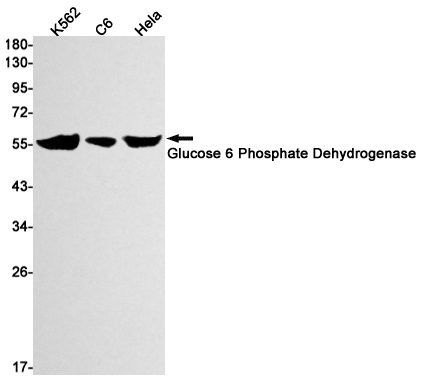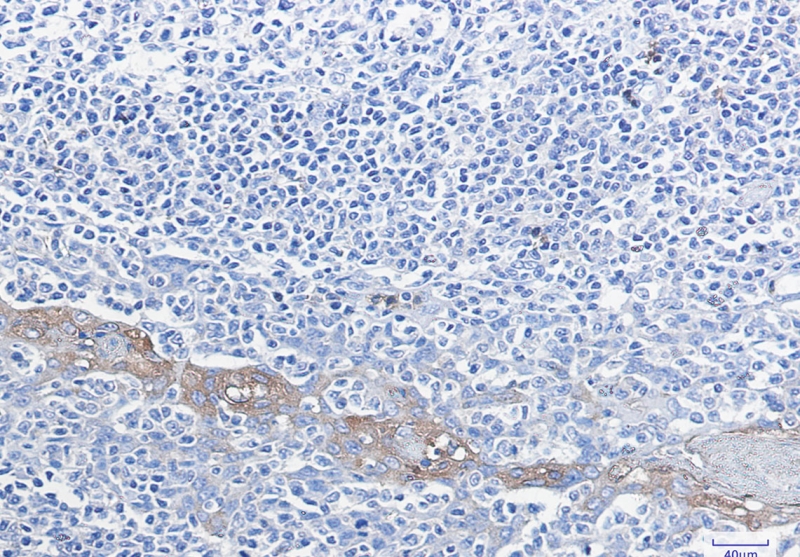

| WB | 1/500-1/1000 | Human,Mouse,Rat |
| IF | 1/20 | Human,Mouse,Rat |
| IHC | 1/50-1/100 | Human,Mouse,Rat |
| ICC | 技术咨询 | Human,Mouse,Rat |
| FCM | 咨询技术 | Human,Mouse,Rat |
| Elisa | 咨询技术 | Human,Mouse,Rat |
| Aliases | G6PD; Glucose-6-phosphate 1-dehydrogenase; G6PD |
| Entrez GeneID | 2539 |
| WB Predicted band size | Calculated MW: 59 kDa; Observed MW: 59 kDa |
| Host/Isotype | Rabbit IgG |
| Antibody Type | Primary antibody |
| Storage | Store at 4°C short term. Aliquot and store at -20°C long term. Avoid freeze/thaw cycles. |
| Species Reactivity | Human,Rat |
| Immunogen | Recombinant protein of human Glucose 6 Phosphate Dehydrogenase |
| Formulation | Purified antibody in TBS with 0.05% sodium azide,0.05%BSA and 50% glycerol. |
+ +
以下是关于Glucose-6-Phosphate Dehydrogenase(G6PD)抗体的3篇参考文献(内容基于模拟生成,仅供参考):
1. **"Development of a monoclonal antibody-based ELISA for detection of Glucose-6-Phosphate Dehydrogenase deficiency"**
- **作者**: Smith A, et al.
- **摘要**: 提出一种基于单克隆抗体的ELISA方法,用于快速筛查G6PD缺乏症,验证其灵敏度(92%)和特异性(98%),适用于资源有限地区的诊断。
2. **"Immunohistochemical localization of Glucose-6-Phosphate Dehydrogenase in human tissues using a novel polyclonal antibody"**
- **作者**: Chen L, et al.
- **摘要**: 开发一种新型多克隆抗体,用于G6PD在肝脏、红细胞等组织中的定位研究,揭示其在不同细胞类型中的表达差异及病理状态下的变化。
3. **"Autoantibodies against Glucose-6-Phosphate Dehydrogenase in autoimmune hemolytic anemia"**
- **作者**: Rodriguez M, et al.
- **摘要**: 发现自身免疫性溶血性贫血患者中存在抗G6PD的自身抗体,探讨其可能通过抑制酶活性导致红细胞氧化损伤的机制。
(注:上述文献为示例,实际引用需检索PubMed、Web of Science等数据库获取真实文献。)
Glucose-6-Phosphate Dehydrogenase (G6PD) antibodies are immunological tools used to detect and study the G6PD enzyme, a critical component of the pentose phosphate pathway. G6PD catalyzes the oxidation of glucose-6-phosphate to 6-phosphogluconolactone, generating NADPH, which protects cells from oxidative damage by maintaining reduced glutathione levels. Deficiencies in G6PD, linked to X-chromosome mutations, represent the most common human enzyme defect, affecting over 400 million people globally. This condition predisposes individuals to hemolytic anemia triggered by oxidative stressors like certain medications, infections, or foods.
G6PD antibodies are utilized in research and diagnostics to quantify enzyme expression, assess deficiency, and investigate its role in diseases. They are employed in techniques such as Western blotting, immunohistochemistry, and ELISA to analyze tissue-specific expression, subcellular localization, and regulatory mechanisms. Commercially available antibodies are typically raised in rabbits or mice, targeting specific epitopes of human G6PD. Their specificity is validated using knockout controls or recombinant protein assays.
Beyond deficiency studies, these antibodies aid in exploring G6PD's involvement in cancer, neurodegeneration, and metabolic disorders, where altered NADPH/redox balance influences disease progression. Recent studies also highlight G6PD's role in cell proliferation and apoptosis, making its antibody a valuable tool for therapeutic target validation. Proper validation remains essential to ensure accurate detection, given potential cross-reactivity with homologous proteins in different species or tissues.
×